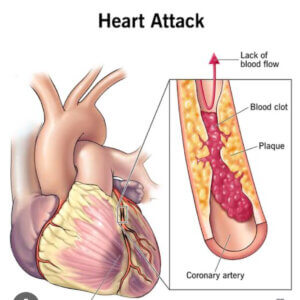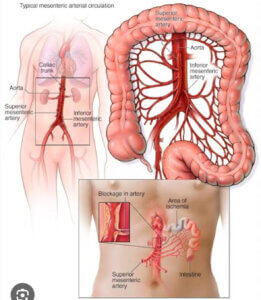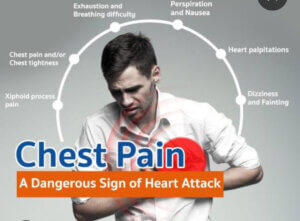
Reading Time: 5 minutes
Heart Attack vs. Intestine Attack: The Shocking Similarities You Need to Know.
Understanding the Similarities Between a Heart Attack (Acute Myocardial Ischemia) and an Intestine Attack (Acute Mesenteric Ischemia)
When we hear the term “heart attack,” it immediately draws attention due to its life-threatening nature. But fewer people are aware that a similar condition can occur in the intestines, called an “intestine attack” or Acute Mesenteric Ischemia (AMI).
While the heart and intestines seem like very different organs, both conditions share striking similarities in how they occur and the impact they have on the body.
What Is a Heart Attack (Acute Myocardial Ischemia)?

A heart attack occurs when the blood flow to a part of the heart is blocked, typically due to a blood clot or a build-up of plaque in the coronary arteries. This blockage prevents oxygen-rich blood from reaching the heart muscle, causing the affected tissue to become damaged or die. This can lead to:
• Severe chest pain.
• Shortness of breath.
• Nausea.
If untreated, a heart attack can lead to permanent heart damage or even death.
What Is an Intestine Attack (Acute Mesenteric Ischemia)?

An intestine attack happens when blood flow to the intestines is blocked, most often in the mesenteric arteries or veins, which supply the intestines with oxygenated blood. This condition, known as Acute Mesenteric Ischemia, can cause parts of the intestine to die due to lack of blood flow. Symptoms of an intestine attack include:
• Severe abdominal pain.
• Nausea and vomiting.
• Distended abdomen.
Without prompt treatment, the lack of blood supply can lead to intestinal tissue death (gangrene) and life-threatening complications such as sepsis.
1. Cause: Blood Flow Blockage
The core similarity between a heart attack and an intestine attack is the underlying mechanism: reduced or blocked blood flow. In both conditions, the blood supply to a vital organ is suddenly interrupted. In a heart attack, it’s the coronary arteries that are blocked, while in an intestine attack, it’s the mesenteric arteries (or sometimes veins) that become obstructed.
The most common reasons for the blockage include:
• Blood clots (thrombosis): These can form either in the heart’s arteries or the mesenteric arteries, leading to ischemia (lack of blood flow).
• Atherosclerosis: The buildup of plaque (fatty deposits) in the arteries can narrow them, making it more likely that a clot will form and block the blood flow. This condition can affect both coronary and mesenteric arteries.
2. Symptoms: Sudden and Severe Pain
Both a heart attack and an intestine attack share a key symptom: sudden, severe pain.
In a heart attack, this pain is usually felt in the chest and may radiate to the arms, neck, or back.

In an intestine attack, the pain is concentrated in the abdomen and is often out of proportion to what might be expected from the physical examination.

• Heart attack: Often accompanied by tightness or pressure in the chest, the pain may also radiate to the left arm, jaw, or upper back.
• Intestine attack: Pain is typically intense and felt in the mid-abdominal region. It may come in waves and can worsen after eating, as digestion increases the oxygen demand of the intestines.
In both cases, the pain is a sign that the tissue is being deprived of oxygen and starting to die, making it a medical emergency.
3. Risk Factors: Similar Health Conditions
Heart attacks and intestine attacks share many of the same risk factors, since both involve issues with blood flow and the cardiovascular system. Common risk factors include:
• Atherosclerosis: Plaque buildup in the arteries, leading to reduced blood flow.
• High blood pressure: Increases strain on the arteries, making them more likely to narrow or become blocked.
• Smoking: Damages the blood vessels, increasing the risk of both heart attacks and intestinal ischemia.
• Diabetes: Contributes to vascular problems that can affect blood flow to both the heart and intestines.
• High cholesterol: Raises the risk of plaque buildup in the arteries.
• Advanced age: Older individuals are more likely to have cardiovascular problems, which increase the risk of both conditions.
4. Emergency Treatment: Restoring Blood Flow
Both heart attacks and intestine attacks require emergency medical intervention to restore blood flow and prevent tissue death. The treatment goals are similar:
• Restoring blood flow: In a heart attack, this is done by opening up the blocked coronary artery, either through medications (like clot-busting drugs or blood thinners), angioplasty, or stenting. In an intestine attack, the same principles apply. Doctors use thrombolytic therapy to dissolve clots, angioplasty to open blocked mesenteric arteries, or surgery to remove the blood clot.
• Surgery: In severe cases of either condition, surgery may be required. In heart attacks, surgeons may perform a coronary artery bypass graft (CABG) to bypass the blocked artery. In the case of an intestine attack, surgery may be needed to remove any parts of the intestines that have died due to the lack of blood supply.
5. Complications: Tissue Death
When blood flow is blocked for too long, the affected tissue dies. In both heart attacks and intestine attacks, this can lead to serious complications:
• Heart attack: The death of heart muscle tissue can result in heart failure, where the heart loses its ability to pump blood effectively.
• Intestine attack: The death of intestinal tissue can cause intestinal gangrene, leading to life-threatening complications like sepsis (a widespread infection) or perforation of the intestines.
In both cases, tissue death can lead to long-term health problems, and the sooner treatment is received, the better the outcome.
6. Life After Treatment: Long-Term Care and Prevention
Both heart attack survivors and those who’ve experienced an intestine attack require long-term medical care to prevent future episodes. Preventive strategies focus on improving cardiovascular health and reducing the risk of clot formation. These include:
• Medications: Blood thinners (like aspirin) are commonly prescribed to prevent future clots. Other medications may be used to control blood pressure, cholesterol, and blood sugar levels.
• Lifestyle changes: Both conditions require patients to make significant lifestyle changes to improve their heart and vascular health. This includes quitting smoking, eating a heart-healthy diet, getting regular exercise, and managing stress.
• Regular check-ups: Ongoing medical monitoring is essential to catch any potential problems early and to adjust treatment plans as needed.
Conclusion
Heart Attack vs. Intestine Attack: The Shocking Similarities You Need to Know. Although a heart attack and an intestine attack affect different organs, the underlying cause—blocked blood flow—is the same. Both are medical emergencies that require immediate attention to prevent tissue death and serious complications. They also share similar risk factors, symptoms of sudden pain, and treatment strategies aimed at restoring blood flow.
Understanding the similarities between these two conditions highlights the importance of maintaining cardiovascular health through a healthy lifestyle and regular medical check-ups. If you experience any sudden, severe pain, whether in your chest or abdomen, don’t wait—seek medical care immediately. Early intervention can make the difference between life and death.
